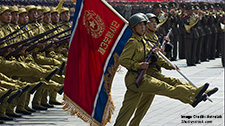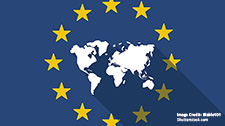Beijing’s Foothold in Central America: El Salvador’s Diplomatic Realignment

Julian Tucker and Anna-Carina Barthelmes
Introduction
The diplomatic struggle between China and Taiwan, officially the People’s Republic of China (PRC) and the Republic of China (RoC) respectively, has intensified in recent years. Under the One China Principle any state wishing to have diplomatic relations with Beijing must suspend its diplomatic recognition of Taipei. Several states have recently made the decision to adjust their foreign policy by opening diplomatic ties with China and dropping Taiwan in order to improve trade or their diplomatic positions.
El Salvador has been one of the most recent countries to do this, ending diplomatic recognition of the RoC in favor of the PRC on August 20, 2018 under the administration of President Salvador Sanchez Cerén. With Taiwan’s international space shrinking, Central America is one of the few bastions in which Taipei still maintains several allies, sparking fears that El Salvador’s neighbors might follow suit.
El Salvador had earlier allegedly requested financial support from Taiwan to develop a port, which Taipei was unable to provide. The PRC, however, guaranteed El Salvador of an immense infrastructure package and in addition, an assurance to promote Chinese tourism. Taipei called out Beijing’s “out of control” behavior and accused it of “dollar diplomacy”, indicating that Taiwan would not entertain a similar policy or a possible bidding war. The United States responded to the diplomatic realignment with a statement decrying San Salvador’s receptiveness to overtures from China and threatening a reevaluation of the Salvadoran-American relationship.
Today China represents Central America’s second-largest trading partner, which brings with it a certain political and economic leverage. Nevertheless, Guatemala, Honduras, Belize and Nicaragua all still diplomatically recognize the ROC. For small countries, the qualitative relationship that Taiwan can offer is often of major importance, as Honduran Ambassador Rafael Sierra Quesada succinctly put it; “[China] doesn’t need us or care about us. With Taiwan we are needed and important.” The opening of relations between Beijing and San Salvador creates an unusual diplomatic situation and raises several questions about the future of entrenched relationships in the region. As Taiwan’s international space shrinks other Central American states may be tempted to follow the Salvadoran lead and realign, seek to reaffirm ties with Taipei, or find other ways to leverage the situation.
The process by which China has gained a new international partner and Taiwan lost an ally, yields insights into how the tense Cross-Strait relationship is affecting politics in places far from East Asia. In El Salvador’s case the considerations driving changes in recognition are both local and international, however, this helps to illustrate how diplomatic realignment works.
Partisan Politics – An Entry Point?
The choice to realign diplomatically is subject to many push and pull factors, but party politics often play an important role in the decision to change recognition. While Taipei is committed to democratic values, close elections in Taiwan’s few remaining partner countries present potential risks. Leadership candidates may be tempted to challenge incumbent opponents by attacking the policy to continue relations with Taiwan at the cost of exclusion from Chinese trade and political projects. El Salvador has long been dominated by two political parties: the Farabundo Marti National Liberation Front (FMLN), and the National Republican Alliance (ARENA). These two parties, former belligerents during the country’s violent civil war, have provided successive presidential administrations since 1989.
The FMLN originated as an umbrella movement comprising of several leftist guerrilla groups, opposing the military regime of the 1980’s. In early 1992, they signed a peace agreement with the government and by the end of the year they put down their arms and reorganized into a registered political party. The party advocates for progressive policies designed to tackle poverty, advance the inclusion of indigenous people as well as improve public health and educational infrastructure. FMLN leaders have also sought to improve relations with left-leaning governments in Latin America, notably Cuba and Venezuela. These latter countries have longstanding relations with Beijing, which have intensified as growing Chinese economic power and strategic interests have augmented ideological inclinations and share an enmity towards American policy in Latin America.
ARENA also came into being in the early 1980’s, in part as a response to the FMLN. Initially the party was intricately linked to the powerful Salvadoran military, and its first leader Roberto D’Aubuisson was a former military intelligence officer. D’Aubuisson has a controversial legacy, having led death squads during the civil war. The party has not distanced itself from him, yet today emphasizes business-friendly policies rather than opposition to communism. Like many conservative parties in Latin America, a legacy of heavy-handedness and authoritarianism haunts ARENA and traces of this impacts the party’s relationship not only with the United States but also Taiwan. While the U.S. provided equipment and financial aid to military strongmen during the Cold War, the rabidly anti-Communist Chiang Kai-shek supplied Latin American partners with anti-insurgency training and other forms of support. During the post-war period successive ARENA-led administrations sought to rebuild the country’s economy by reforming the tax system and reducing barriers to external trade. The ARENA presidency of Francisco Flores Perez in 2001 even went as far as to officially adopt the U.S. dollar as the Salvadoran currency.
Both parties have had to contend not only with the fearsome legacy of the civil war, but also with endemic issues such as poverty and corruption. Another major challenge over the past years has been the proliferation of gang violence in El Salvador. Since 1992, American policy has been to deport undocumented immigrants from Central America, especially members of criminal organizations, with the result that gang membership and organization has rapidly grown. Mara Salvatruche-13 (MS13) and Barrio-18, rival groupings which originated in the U.S., subsequently rose to prominence in El Salvador bringing a concomitant rise in homicide, rape, human trafficking and other serious crimes. Tackling gang related violence and instability, as well as police reform, has been a stumbling block for successive administrations and continues to loom large in Salvadoran politics and daily life.
In February 2019, Nayib Bukele was elected as El Salvador’s president, the first time the post was taken up by a candidate from neither FMLN nor ARENA since 1989. Although he sought to present himself as a political outsider and capitalize on disenchantment with the system, Bukele is a veteran politician. He had previously served as an FMLN mayor of San Salvador, during which time he visited Taiwan and was received by Tsai Ing-wen. He broke with the FMLN in 2017 and joined the Grand Alliance for National Unity (Gana), a party originally formed by ARENA dissenters but with a track record of cooperating with the FMLN, in a bid to run for high office.
An Awkward Triangle: El Salvador, Taiwan, and the U.S.
Shortly after his election in March, Bukele sought to mend the strained relationship between El Salvador and the U.S., referring to cooperation between the two states as “an imperative.” On the relationship with China he struck a cooler tone than his predecessor Cerén, criticizing Beijing’s approach to foreign relations. Nevertheless, Bukele’s administration confirmed El Salvador’s recognition of the PRC, ruling out a restoration of ties with Taiwan.
A reason for the reversal of Bukele’s stance on China may be the perceived unreliability of U.S. aid. Washington provides 620 million USD a year for gang prevention programs to the region. However, the Trump administration began cutting aid in March 2019 after repeatedly threatening to do so. Securing the continued recognition of Taiwan by working with international partners is a priority for the U.S. government, a policy which helps explain why Taiwan’s remaining allies are clustered in regions where Washington wields great influence. In rebuking the decision by San Salvador to suspend ties with Taipei, the Trump administration alluded to the Monroe Doctrine, charging Beijing with meddling in the internal affairs of the Americas. There is a certain irony in this line of reasoning, as Beijing steadfastly maintains that the Taiwan Question is an internal affair.
Washington may be Taipei’s most significant single backer, but support for Taiwan and its diplomatic aspirations only forms a subset of American foreign policy. Each of the countries that continue to recognize the ROC have their own, often complicated relationships with the U.S. and Taipei’s diplomacy must take account of this. Relations with China is only one aspect of the complex Salvadoran-American-Taiwanese triangle. For the White House, a prominent issue governing the U.S.-Salvadoran relationship has been immigration from Central America, which has strained relations between San Salvador and Washington, and is a major component of American domestic politics. President Trump has made numerous statements tying immigration to increases in violent crime, focusing especially on MS-13. He notably referred to El Salvador among what he termed “shithole countries.” The response has been a sharp decline in the approval rating of the American leadership, while most Salvadorans approved of U.S. policy in 2012, by 2019 a majority indicated disapproval for the job performance of the American president.
Taiwan’s public diplomacy towards El Salvador had been rooted in “Operation Vanguard”, a project which started in the 1960s and aimed at supporting underdeveloped countries economically and politically. In El Salvador, this support took the form of technical expertise to improve agricultural production. Other areas to which Taiwanese public diplomacy historically extended were health care, education and infrastructure.
From 2008 the El Salvador-Honduras-Taiwan Free Trade Agreement (TLC) was in effect. The TLC allowed El Salvador to export 80,000 tons of sugar to Taiwan free of tariffs. The agreement was planned to be cancelled in March 2019, due to the change in San Salvador’s China policy, which was met with resistance from the Salvadoran Sugar Association. In contrast to Taiwan, China places high tariffs on sugar reaching as much as 85 percent, worrying Central American sugar producers.
A New Partnership?
Yet there is more to China’s relationship with El Salvador than just “sugar diplomacy.” Chinese investors first showed interest in the port at La Union, which had been characterized as unprofitable by several companies in September 2018. Discussions between the Asia Pacific Xuan Hao Investment Company and the Port Executive Autonomous Commission of El Salvador (CEPA) soon followed. Beijing then drafted a document describing plans to build a special administrative zone and requested a 100-year lease of a 1,076-square-mile area. The zone was set to be created by Asia Pacific Xuan Hao, which is a Chinese state-owned company that manufactures, amongst other things, laser pointers, laser glare series, sound wave series and private satellite networks. The company initially cited a close relationship with the Chinese military, but removed references to this after Salvadoran media reported on it.
Aside from the port in La Union, Chinese investors also turned their attention to Isla Perico, a nearby island which could become part of a larger port infrastructure project. A vision of creating a commercial trading hub on the island was scrapped, however, when locals vociferously opposed it. Bo Yang, a Chinese-Salvadoran businessman and Vice President of the China – El Salvador Chamber of Commerce, nevertheless bought up part of the island in November 2019.
For its part, Washington fears that a special zone in the port will enable Beijing to expand its military and intelligence gathering capabilities. This is part of a wider trend in which the U.S. government has expressed concerns to its partners abroad that Chinese companies with close ties to the Chinese leadership will be able to collect data for political or security related purposes. In addition, such plans could potentially boost China’s economic leverage in the region, upsetting conditions in broader Central America, for instance by creating an alternative trade route to the Panama Canal.
The Balancing Act
Despite these concerns, Washington’s approach to El Salvador has included cuts in aid as well as demeaning comments from the President himself, pushing the Central American country away from its wider policy agenda. To some extent the U.S. administration is constrained by American domestic politics but taking a hard line with San Salvador will certainly impact other relations, not least with Taiwan.
China meanwhile has emerged as a viable alternative partner in some areas, the first time in decades this has been an option for countries like EL Salvador, and members of the political establishment have taken note. While it may be tempting to put the realignment down to the FMLN administration of Sanchez Cerén, it should be noted that prior to the diplomatic truce under the Ma Administration, earlier ARENA-led administrations had signaled interest in reviewing the relationship, before strongly pledging to maintain them in 2009.
Beijing, by contrast, is now able to offer financial support and economic opportunities without similar domestic political constraints. Faced with major challenges, it is no surprise that El Salvador is drawn to what China can offer. While critics warn that Chinese support is self-serving and geared towards the long-term benefit of the CPC, the Salvadoran government faces immediate concerns that need addressing. For the freshly elected Bukele it might be difficult to expend political capital to reverse his predecessor’s decision if all it brought him was the perception of bowing to American pressure. Nevertheless, Beijing now needs to deliver on its promises, not only to cement its relationship with a new partner, but also to extend its foothold in a region which is a redoubt of Taiwanese diplomacy. This might be difficult not only due to the coronavirus, but also the looming economic recession.
Taipei would appear the loser in El Salvador’s realignment, having lost an ally to Beijing and seen its international space shrink further. Yet, Taiwan’s diplomatic-strategic situation may not be as dire as it appears at first glance. Some form of semi-official economic relationship based on commodity imports may prove to be more sustainable than large-scale development projects or promises of major investments or loans. As small countries, Taiwan and the Central American republics can relate to one another and foster qualitative relationships that would be difficult to maintain for the U.S. or the PRC. Taipei has come a long way from the days of “checkbook diplomacy,” honing its ability to engage with diverse partners. It will have to ensure that its relationships do not become a side show to the American administration’s wider policy objectives, however, and instead find ways to strike a balance between bilateral and regional considerations.
For the Bukele government in El Salvador the challenge will be to explore policy options going forward. If the relationship with Beijing yields political and economic benefits that allow the administration to tackle corruption, police reforms and gang violence, so much the better. Perhaps the new president will be able to find a modus vivendi that allows for a continued economic relationship with Taiwan despite the One China Policy. At the same time, he will likely have to strike a balance between pro-Taipei and pro-Beijing elements of the political and business establishments. In the coming years El Salvador may well prove to be a testing ground of whether the process of realignment from Taiwan to China has been worthwhile.
Related Publications
-
The Political Split at the Heart of Taiwan’s Struggle against Foreign Disinformation
Taiwan’s struggle against foreign disinformation and concerns about China’s impact on its 2024 election has received much international attention recently. This issue brief examines the domestic and international politics behind […]
-
ISDP Annual Report 2023
ISDP’s Annual Report for the year 2023. We look back on 2023, a year in which tensions and conflicts captured the strategic space in ISDP’s focus areas, making headlines around […]
-
Russia-DPRK Relations: Implications for the UNSC’s Mandate
The burgeoning military cooperation between Russia and the DPRK poses a significant challenge to global security. The simplified characterization of the alleged arms deal as a product of converging interests […]
-
Messaging Mayhem: The EU’s Struggle for Clarity on Israel-Palestine
Few long-standing conflicts evoke such intense discussions and foreign policy debates as Israel-Palestine, be it within or between the European Union’s 27 member states – informed by differing historical and […]
-
An Interview with Professor Torbjörn Lodén: EU and U.S. Relations with China in Retrospect and Looking Ahead
The Institute for Security & Development Policy (ISDP) has for the past three years had the honor and privilege of Professor Torbjörn Lodén serving as its Head of the Stockholm […]




